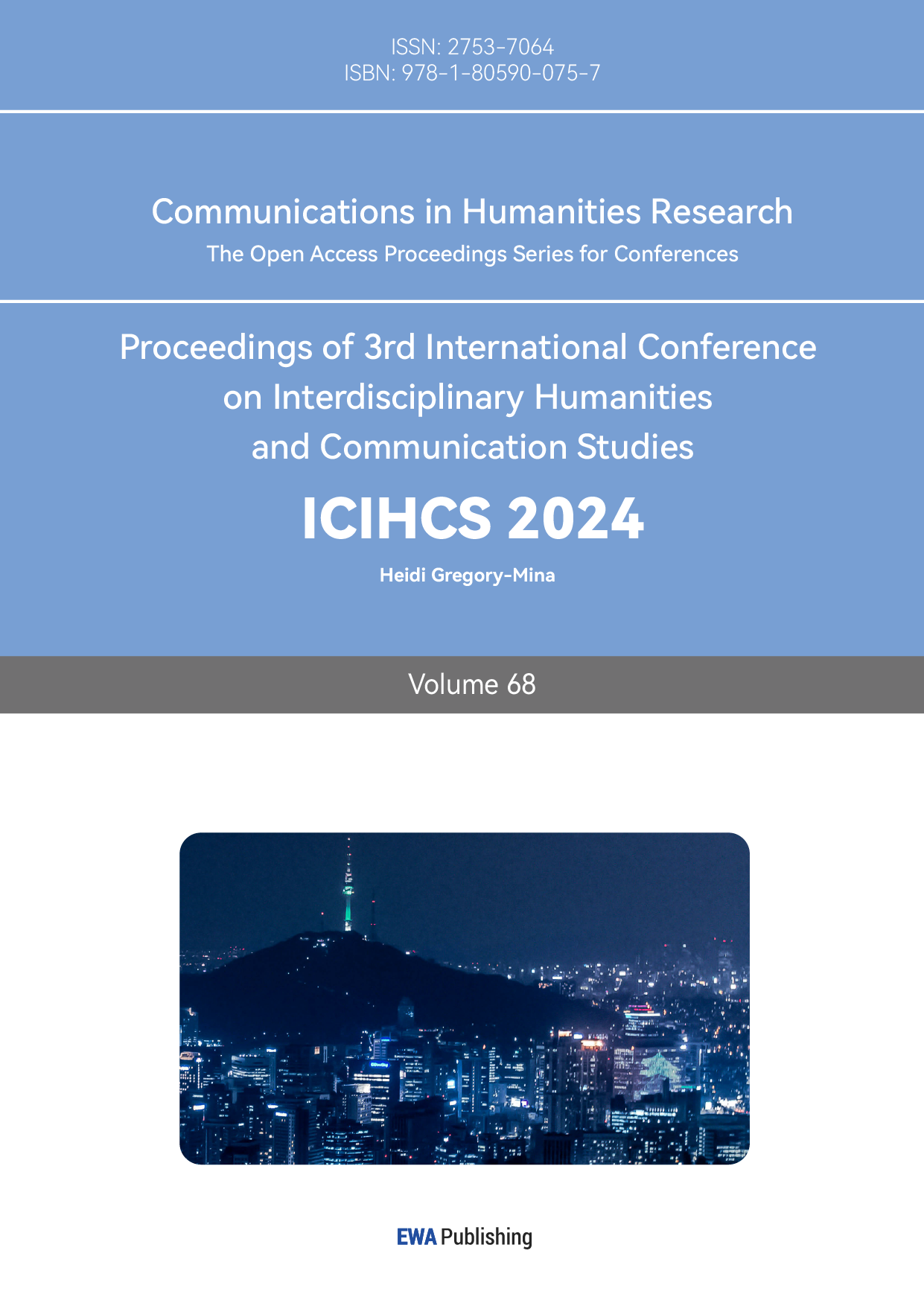1. Introduction
Since the earliest video game (Tic Tac Too) appeared in 1952, video games have undergone decades of development. Compared to video games that were once limited to the entertainment industry, today's video games are gradually transforming into a cultural carrier. Compared to traditional cultural media that require consideration of geographical and cultural boundaries, video games have their unique advantages. It can vividly convey different cultural contents to audiences worldwide through the shaping of virtual worlds and virtual characters. This transmission method accelerates cultural exchange on a global scale and provides an important platform for cultural discussions. This is particularly true for games with strong social themes [1, 2].
While the gaming industry is thriving and receiving increasing attention, the diversity, equity, and inclusion (DEI) culture originating from the United States is gradually becoming one of the core themes of society. The DEI culture originated during the civil rights movement, manifested in society's reflection and resistance to racial discrimination and social injustice. The DEI culture that has developed to this day includes a wider range of content, such as gender equality and greater inclusion towards different sexual orientations. DEI reflects the pursuit of social equality and justice in contemporary society, and the thriving gaming industry during the same period has become an excellent carrier of DEI culture. Nowadays, DEI culture is gradually permeating into the game content, development design, and evaluation system of video games.
The promotion of DEI culture in contemporary times is inseparable from the support of the government. The diverse cultural composition of American society, as its birthplace, has laid the foundation for the development of DEI in the cultural industry. But this does not mean that the implementation of DEI related policies will be smooth sailing. For instance, some people point out that overemphasizing diversity and inclusion may lead to the neglect of the majority or mainstream culture, resulting in new inequalities. This issue is particularly prominent in areas involving resource allocation such as employment and education. Furthermore, an unresolved issue is how to effectively measure and evaluate the impact of DEI policies in the cultural industry sector. In the field of cultural industry, the impact of DEI is often difficult to quantify, and its influence is also influenced by other social factors. The above issues indicate that although DEI is constantly being promoted as a concept representing social progress, it still faces complex challenges in the process of promotion and needs to be continuously improved in practice and development.
After observing from various aspects, a representative independent video game product was chosen- "Black Myth: Wukong". Black Myth: Wukong "is an action role-playing game developed and published by Game Science in2024. The game tells the story of a monkey based on the character of Sun Wukong in the Chinese classical novel "Journey to the West".
The game has received widespread attention from the industry since its release. On the Chinese social media platform Weibo, multiple topics related to "Black Myth: Wukong" have accumulated over 4 billion views. On August 23rd alone, the theme of "sales exceeding 10 million copies" received 170 million views. On another social media platform, Xiaohongshu, photography competitions and hand drawn game themes organized and participated by players rank first. The hidden plot and movie editing of game content rank first on international short video platform Tiktok and Chinese domestic short video platform Kwai. In addition, the offline theme concert of "Black Myth: Wukong" went on sale on August 28th and sold out in just 2 minutes.
According to data from research institution VG Insights, "Black Myth: Wukong" has sold more than 15 million copies worldwide. A research report released by Huatai Securities on August 27 estimated that "Black Myth: Wukong" will exceed 20 million copies in its first month, with overseas revenue accounting for about 20%; annual sales are expected to reach 30 to 40 million copies, with a corresponding revenue of 10 to 14 billion yuan. This achievement allowed "Black Myth: Wukong" to enter the global game bestseller list. (https://finance.sina.com.cn/jjxw/2024-08-31/doc-incmpcsq5972730.shtml)
The intricate development process of this game has strong research value for studying the development of DEI and the changing attitudes towards DEI among people. On June 14, 2024, Game Science, the developer of "Black Myth: Wukong," rejected a $4 million Diversity, Equity, and Inclusion (DEI) "political correctness" guidance contract proposed by IGN and other companies. This incident has sparked widespread social discussion, especially in the gaming industry. Despite Game Science's rejection of this collaboration and resulting in criticism of the company's internal culture. But the exposure of this incident has sparked public discussion on the role of DEI in the gaming industry and allowed us to observe people's attitudes towards DEI elements in the gaming industry.
This article will take the representative video game "Black Myth: Wukong" as an example to explore the manifestation of DEI in video games. The specific difficulties encountered in implementing DEI elements in game content, as well as changes in public attitudes towards it, will also be discussed.
2. Literature review
2.1. Research object: the development and social role of video games
After decades of development, video games have evolved from a simple form of entertainment to a complex cultural medium. Early video games had relatively limited content and existed more as a form of entertainment. However, with the transformation of social culture and demand, video games are gradually developing into an important cultural medium, not only retaining their original entertainment functions, but also assuming the responsibility of expressing ideas and cultural dissemination. Nowadays, video games have become a cultural medium that reflects various issues in contemporary society, such as gender equality, racial diversity, and social justice. This has led to its recognition and research as a cultural communication medium in the academic community. Some scholars point out that thanks to the rapid development of digital technology, video games have become a new medium for cultural dissemination, exerting a significant impact on the dissemination of human culture. Through online interaction and immersion, video games break geographical and cultural boundaries, providing a communication platform for global players and accelerating cross-cultural communication on a global scale.
2.2. Research method: the evolution and academic superiority of mixed research methods
The mixed research method is a type of research method that uses both quantitative and qualitative methods to collect or analyze data in an independent study. It is particularly suitable for problems similar to this study that cannot be fully explained by qualitative or quantitative methods alone. For this experiment, qualitative research methods to better capture and analyze player emotions was used, while quantitative research methods allowed us to analyze and speculate on a wider range of social attitude tendencies from a larger data sample.
2.3. Past research and findings: the impact of political correctness actions on the entertainment industry and public attitudes
The impact of actions related to political correctness is mostly concentrated in the entertainment industry, and the public's attitude towards this phenomenon is not uniform. Studies have shown that actions related to political correctness do indeed promote social equality. However, some studies have also pointed out that excessive political correctness may lead to the opposite effect, as people may see political correctness as a restriction on the creative freedom of the entertainment industry and develop a resistance to political correctness. For example, the racial diversification of the cast in the movie "The Little Mermaid" has sparked widespread social controversy, with different groups having mixed reviews. These studies provide a reference for understanding the role of DEI in video games, illustrating that public attitudes may have complex reactions as social issues change.
2.4. Theoretical basis: the theory of social imagination
C. Wright Mills proposed the theory of social imagination, emphasizing the understanding of the relationship between individual experiences and broader social and historical contexts. In this study, social imagination theory provides theoretical support for analyzing public attitudes towards DEI. This theory helps us better understand the cultural and historical context within a larger social framework, as well as how these attitudes are influenced by social discourse and policy directions, from the attitudes of individual players in the "Black Myth: Wukong" event.
3. Data analysis process
The data analysis process of this study includes a series of steps, mainly collecting audience attitudes and emotional reactions from YouTube discussions about "Black Myth: Wukong" through detailed standards and procedures. The goal of these process is to comprehensively capture the public's attitudes towards DEI elements in the gaming industry and the emotional changes of players towards game content through a series of methods including NLP and digital ethnography, and to conduct in-depth research on player groups. At the same time, comments that are difficult to analyze and understand were also excluded, ensuring the rigor and representativeness of the data, and thus ensuring the persuasiveness and reliability of the research conclusions.
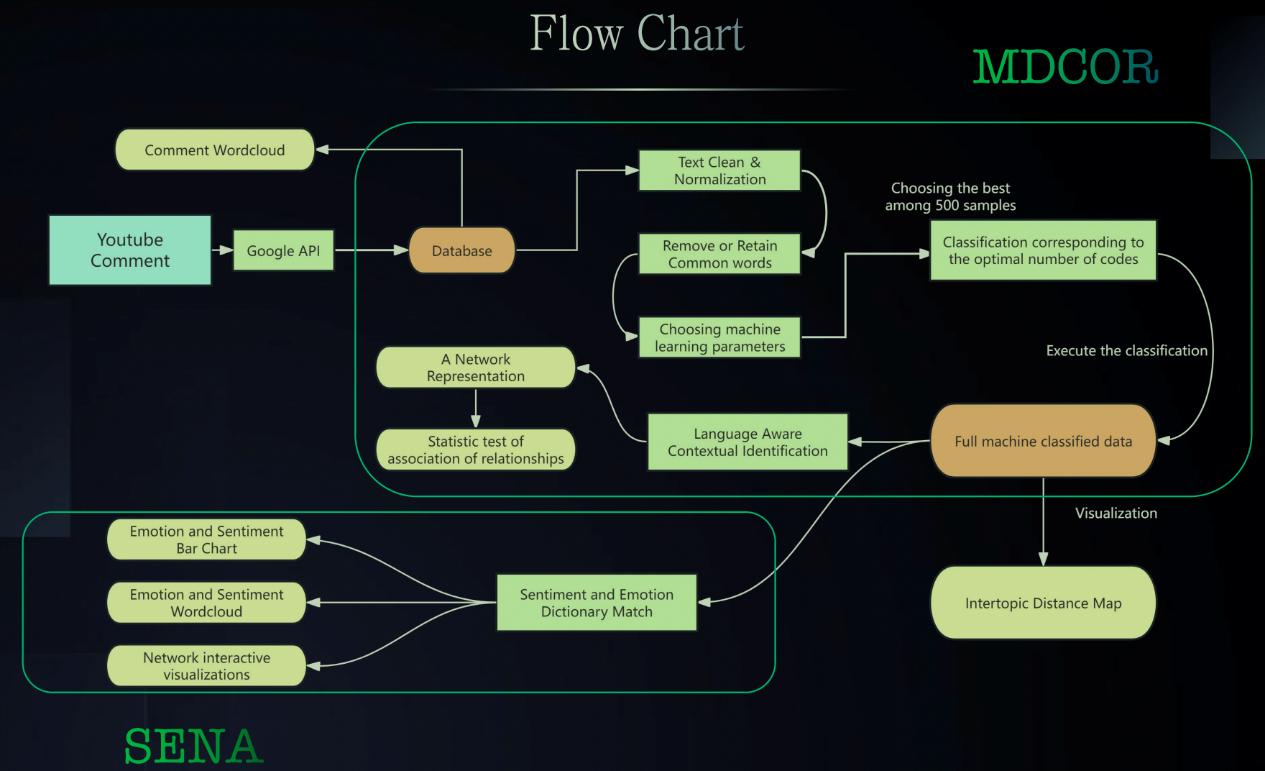
Figure 1: Flow chart of the data collection and analysis
3.1. Audience attitudes & sentiments
Method:
In the first stage, a large amount of comment data related to representative videos of "Black Myth: Wukong" on YouTube will be collected, and research will use automated tools in this process. After collecting the data, an emotion analysis model (NLP) will be used to analyze the comments and identify trends in positive, negative, or neutral emotions. The research mainly analyze commentators' attitudes towards game related events, such as audience reactions to the release of new trailers or interviews with game developers.
In order to ensure the YouTube videos that research select have sufficient representativeness, the videos selected from YouTube need to meet the following criteria:
To make sure there is a sufficient number of comments and audience reactions, the video must have been published for at least one month.
To guarantee the diversity and coverage of comments, the video must have more than 100,000 views and over 1,000 comments.
No private data will be involved, only public comments will be collected.
Analysis Method:
Natural Language Processing (NLP) techniques will be utilized to conduct sentiment analysis on the comments, identifying trends of positive, negative, or neutral emotions. This method will be based on word frequency statistics, sentiment dictionaries, and other tools to quantify user emotions, providing an overall emotional landscape of the audience's perception of "Black Myth: Wukong."
3.2. Organic, thick, unstructured data
Method:
The second step involves extracting organic and unstructured data from YouTube's User-Generated Content (UGC). Unlike the comments in the first phase, this data focuses on video content generated by users, such as gameplay sharing, player discussions, and reaction videos. These contents reflect genuine emotional responses and viewpoints, offering a more diverse perspective.
Analysis Method:
A combination of manual and automated video analysis tools will be used to qualitatively analyze this unstructured video content. The manual coding part will deeply interpret the emotions, viewpoints, and argumentation patterns expressed in the videos, while automated tools will help identify common themes and lexical patterns.
3.3. Digital ethnography
Method:
The third step is conducting digital ethnography research, delving into specific player groups and communities on YouTube. By observing these groups' behavior and interaction patterns over an extended period, it can reveal the collective reactions triggered by "Black Myth: Wukong" within a particular cultural context. The digital ethnography method aids in understanding how these users construct game culture, a sense of identity, and collective emotional expression within their groups.
Analysis Method:
This research will employ participatory observation, following these channels and their audience interactions over time. By analyzing comments, bullet comments, and community discussions, the research reveal the internal interaction structures and cultural production processes of the group. Qualitative analysis will focus on the language patterns, emotional expressions, and identity construction of player groups in discussions. This method helps us better compare the audience's emotional attitudes towards "Black Myth: Wukong" before and after the $7 million event and the game's social impact on the cultural dimension.
Through these three steps, data collection strictly follows platform standards, ensuring representativeness and scientific rigor. The data source is singular (YouTube) but covers multiple levels of user-generated content and discussion dynamics. This process lays a solid foundation for subsequent quantitative and qualitative analyses, aiding in a better understanding of the social response to "Black Myth: Wukong" within a specific cultural context.
4. MDCOR analysis (second edition)
4.1. Negative sentiments: resistance and aversion to the culture of awakening
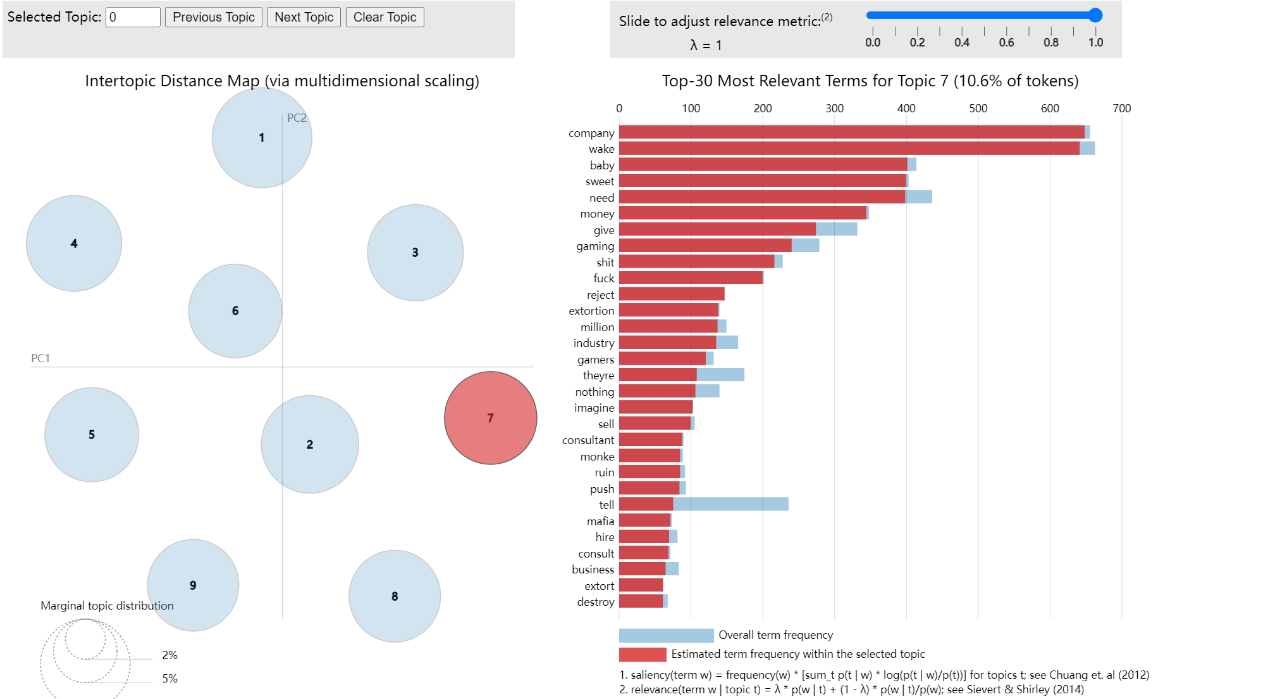
Figure 2: Topic 7’s most relevant terms in the intertopic distance map for all the comments
Before: Prior to the culture of awakening becoming a contentious issue, commentators primarily focused on the content, innovation, and cultural background of games. They held a more positive attitude towards games based on Chinese mythology, such as "Black Myth: Wukong," and the culture of awakening was not a main topic of discussion.
Emotional Attitude: Players showed interest in the gaming culture and support for developers, with the culture of awakening not drawing widespread attention. At this time, the culture of awakening was just a part of the game's background and was not seen as a threat or interference.
After: As the event developed, the culture of awakening became the core of the controversy. Commentators began to express strong resistance to the involvement of the culture of awakening in the video game industry, believing it excessively interfered with the normal development of the industry, even regarding it as "extortion."
Emotional Attitude: The strong criticism and aversion of commentators towards the culture of awakening were evident in their belief that it brought negative interference in business and culture. The culture of awakening was seen as a threat to the development of the industry, especially in terms of creative freedom and business decisions, and this sentiment was significantly strengthened.
Summary:
Before: The culture of awakening was not the focus, and comments leaned towards support and anticipation for the game.
After: The culture of awakening became the focus of the debate, and emotions in the comments turned to strong aversion and resistance.
4.2. Criticism: questioning the commercialization of the culture of awakening
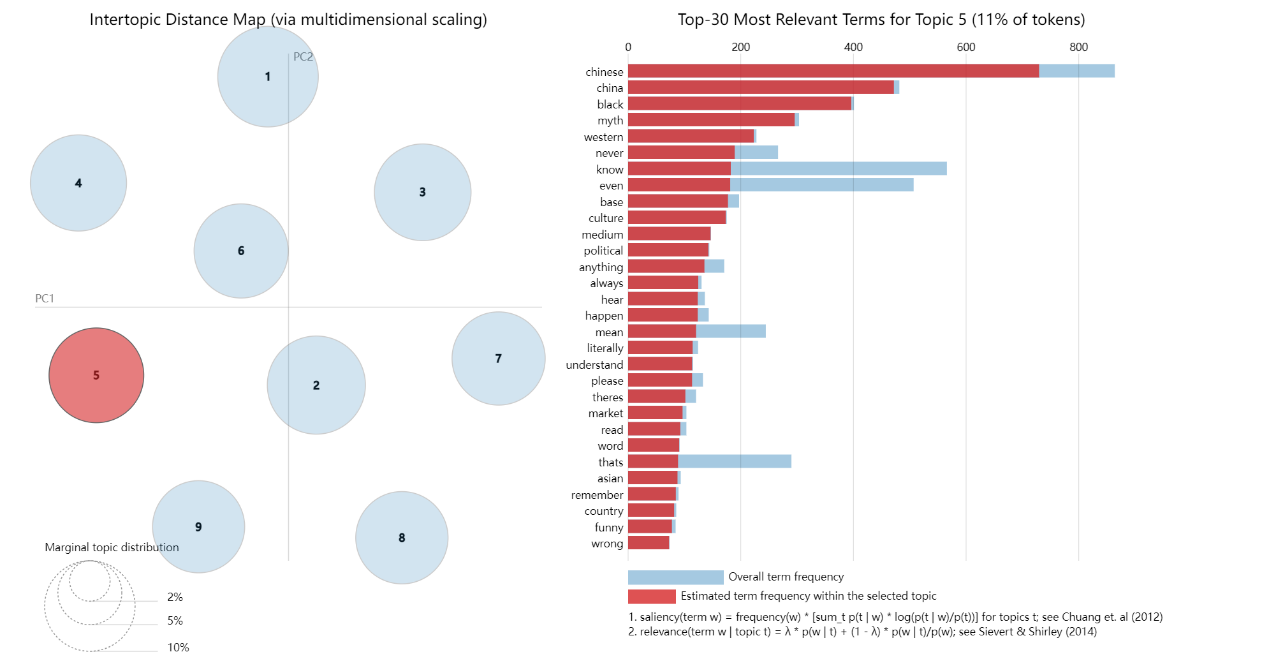
Figure 3: Topic 5’s most relevant terms in the intertopic distance map for all the comments
Before: Prior to the event, players were more focused on the game content itself and its cultural value, with little discussion about awakening culture. The issue of commercialization and ethical conflict is not prominent.
Emotional Attitude: Players mainly focus on the Chinese cultural background of the game, and almost no one pays attention to the commercialization of awakening culture. During this period, players increasingly viewed games as cultural works rather than commercial tools.
After: After the incident, players began to notice the commercialization of Awakening Culture and expressed dissatisfaction with it. In the eyes of players, the behavior of consulting firms and businesses is exploiting awakening culture for profit, rather than promoting true social progress. The phenomenon of awakening culture being questioned as a "tool" or "means" reflects the public's skepticism towards its purpose.
Emotional Attitude: Players believe that commercial organizations are using Awakening culture to manipulate the market and company decisions. It is no longer seen as a force for social progress, but as a means for commercial organizations to profit, deviating from its original intention. This phenomenon has made commentators feel angry and dissatisfied.
Summary:
Before: The commercialization of the culture of awakening did not attract much attention, and comments were mainly focused on the game content.
After: The commercial operations of the culture of awakening were questioned, and commentators generally held a critical attitude towards it.
4.3. Anger and aversion: awakening culture associated with extortion and threats
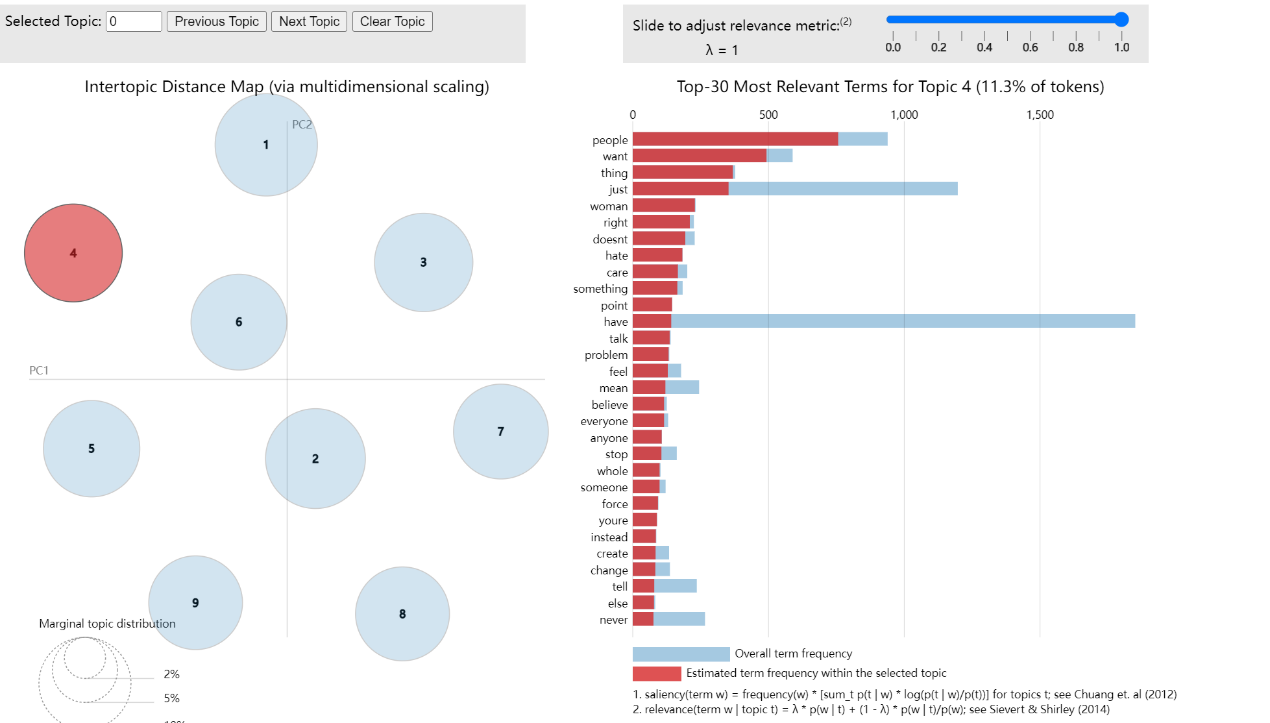
Figure 4: Topic 4’s most relevant terms in the intertopic distance map for all the comments
Before: Before the event, players did not question the creative freedom of the gaming industry too much, and their comments were more related to the artistic and cultural expression of the game. During this period, almost no players associated awakening culture with extortion or threats.
Emotional Attitude: Players are more expressing their appreciation for game content and the artistic value of game culture, and almost no players believe that awakening culture will limit the creative freedom of games.
After: After the event, players began to perceive the awakening culture as a threat to the gaming industry. Some people are beginning to see in the comments that awakening culture is a mandatory cultural trend, and game companies will be forced to compromise and accept relevant guidance. And players also expressed concerns about whether game companies would receive extortion when receiving guidance,
Emotional Attitude: Players express anger towards the awakening culture, believing that it restricts creative freedom and poses a threat to the development of the gaming industry.
Summary:
Before Phase: Players do not believe that awakening culture will affect the creative freedom of the game, and the comments focus more on the game content and artistic quality.
After Phase: Players believe that the awakening culture has affected the creative freedom of games, and comments during this period express more resistance and anger towards the awakening culture.
4.4. Disappointment and skepticism: worries about the future of the gaming industry
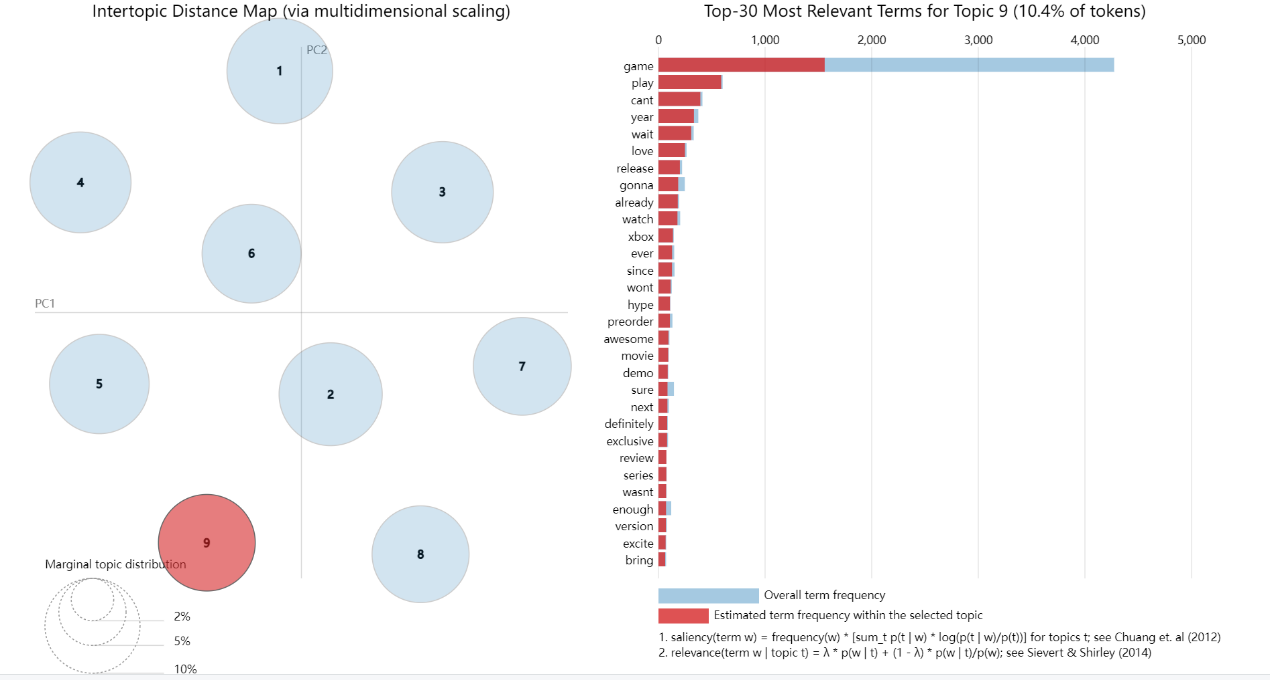
Figure 5: Topic 9’s most relevant terms in the intertopic distance map for all the comments
Before: Before the event, players were full of confidence in the future of the gaming industry and believed that there would be more video games with a Chinese cultural background. The comments do not express concerns about the future of the gaming industry.
Emotional Attitude: There was anticipation for innovation and confidence in game developers and industry development. The culture of awakening did not cause much concern in terms of driving industry innovation.
After: After the event, the excessive interference of the culture of awakening was thought to suppress innovation, and commentators began to worry about the future development of the industry, believing that the culture of awakening could lead to a halt in industry innovation and market segmentation.
Emotional Attitude: Commentators felt disappointed, believing that the negative impact of the culture of awakening on the industry was profound, especially in terms of restricting innovation.
Summary:
Before: Players are full of confidence in the future of the gaming industry and expect more innovation in game industry.
After: Players express concerns about the future of the gaming industry, believing that awakening culture limits innovation in the gaming industry.
Comprehensive Summary of Emotional Changes Before and After:
This comparison of Before and After shows that the culture of awakening has gradually risen from a marginalized topic to the core of industry disputes, affecting the public's attitude towards the gaming industry, especially in terms of creative freedom and the future development of the industry.
5. SENA analysis
5.1. Emotion recognition
Emotional analysis tools are used to identify the main emotions in the text, such as sadness, trust, disgust, anticipation, anger, and surprise.
The emotional data in the document is based on the analysis of game reviews and related topics, including discussions around the Chinese mythological character Sun Wukong and issues related to Diversity, Equity, and Inclusion (DEI).
5.2. Theme recognition
The core themes analyzed include Sun Wukong (a figure from Chinese mythology), game mechanics, political correctness, and DEI (Diversity, Equity, and Inclusion).
Keywords (such as "monkey," "king," "earth," "myth") are used to reveal the main content of the discussion, involving the cultural and mythological background of Sun Wukong, and how these stories are reinterpreted in a modern context.
5.3. Emotion and theme correlation analysis
Emotion is linked to specific themes, such as players' disgust with game mechanics or criticism and satire of DEI policies.
During the before phase, emotions were mainly focused on feedback about the game content itself, such as negative experiences with game mechanics; the after phase began to shift towards discussions about social issues behind the game (such as DEI and diversity), and emotions became more complex.
5.4. Before and after comparison
Before: The main emotions were sadness, trust, and negative emotions, related to Sun Wukong and its mythological background. Negative emotions in the mythological context do not necessarily have the negative connotations they do in reality. At the same time, players' dissatisfaction with game mechanics and expectations for improvement were the main focus.
After: The dominant emotions became surprise, sadness, joy, and disgust. Although players showed a certain level of trust in the game itself and appreciated the game company's refusal of a $7 million "ransom," they also expressed satire and criticism towards political rights, diversity, and DEI policies. For example, attacking YouTubers for expressing negative emotions; attacking CCP for saying China is undemocratic. Emotions showed more sarcasm, anger, and disgust, reflecting players' concern for social issues.
Comparison Summary: Emotions transitioned from feedback on the gaming experience in the before phase to discussions about more social, cultural, and political issues in the after phase. Emotions evolved from relatively simple dissatisfaction with the game to more complex political criticism, showing an expansion and deepening of emotions and topics.
5.5. Explanation of emotional complexity
The document emphasizes that certain emotions (such as sadness or disgust) may not be negative in the traditional sense within the context of Chinese mythology. For example, in the mythological story of Sun Wukong, sadness or negative emotions may be a necessary narrative component and do not necessarily need to be over-interpreted as negative.
In the after phase, the emotional analysis specifically pointed out sarcasm, with players expressing anger or disgust by satirizing political correctness and DEI policies, and these emotions may be interpreted differently across various cultural and social backgrounds.
5.6. Summary and conclusion
By combining emotional analysis data with themes, it is concluded that players' emotional responses not only reflect their attitudes towards the game but also reveal their views on broader social issues (such as diversity and DEI). The diversity and complexity of emotions demonstrate how the gaming community.
6. Limitation
The present study, while offering novel insights, is not without its limitations, which are acknowledged and discussed below.
The research is contingent upon machine learning and natural language processing (NLP) techniques for the automated extraction of sentiments from a vast array of YouTube comments. Its limitations on Sentiment Extraction are noteworthy. Despite the proficiency of these technologies in managing large datasets, they encounter challenges when deciphering subtle emotional expressions and complex rhetoric [3].
In the research process, the content analyzed mainly came from video comments on YouTube, which included a large amount of internet slang. The topic analysis tools MDCOR and SENA used in this study use pre-defined dictionaries or predetermined rules for analysis. As of now, high-quality, high-coverage, emotion lexicons do not exist for any language [4], which may lead to inaccurately analyze semantics and emotions when dealing with newly emerging words or internet slang. These semantic shifts often elude word-by-word analysis, leading to potential misinterpretations of sentiment. Future research might benefit from incorporating advanced semantic analysis algorithms to better capture nuanced emotional expressions and implicit meanings [3].
During the analysis process, it is also noticeable that sometimes there may be sarcastic or satirical comments about the game content or the development of events in video comments. Emotions are, by nature, subjectively experienced in a specifc context, so their objective assessment is very difficult [5,6]. The intended meaning of these comments is often different or even opposite to the direct meaning expressed in the discourse. Based on the analysis that has been completed, the research have found that the language tools that was used cannot accurately understand the meaning of these comments. Analysis results may have inaccuracies when analyzing these comments. This limitation may result in the misinterpretation or omission of certain complex expressions, thereby affecting the comprehensiveness and accuracy of thematic analysis [3].
The limitations of this research mainly stem from the automated nature of data processing, the limited dictionary of analysis tools, and the difficulty of analysis tools in analyzing complex semantic expressions. In future research, it is believed that adding manual annotations can be considered to specifically analyze comments that are difficult to analyze emotions, in order to compensate for the limitations of machine learning. In addition, it is also believed that improving language analysis tools, such as perfecting semantic dictionaries, can enhance the accuracy of sentiment and semantic analysis.
Acknowledgement
Honghan Yuan, Yuanjian Meng and Runbang Sun contributed equally to this work and should be considered co-first authors.
References
[1]. Singh, A., & Glińska-Neweś, A. (2022). Modeling the public attitude towards organic foods: A big data and text mining approach. *Journal of Big Data*, 9(1),2. https://doi.org/10.1186/s40537-021-00527-7
[2]. Henson, T. D. (2024). Fentanyl, Social Media, and Health Policy: A Mixed-Methods Health Policy Analysis of Public Comments on YouTube Videos About Fentanyl [Doctoral dissertation, Central Michigan University
[3]. González Canché, M. S. (2023). Machine driven classification of open-ended responses (MDCOR): An analytic framework and no-code, free software application to classify longitudinal and cross-sectional text responses in survey and social media research. Expert Systems with Applications, 215, 119265. https://doi.org/10.1016/j.eswa.2022.119265
[4]. Mohammad, S., & Turney, P. D. (2013). Crowdsourcing a Word-Emotion Association Lexicon. Computational Linguistics, 39(3), 575-590.
[5]. Weiss HM. No Title. In: Emotions in the workplace: Understanding the structure and role of emotions in organiza tional behavior. 2002. p. 20–63.
[6]. Wu Z, Zhang Y, Chen Q, Wang H. Attitude of Chinese public towards municipal solid waste sorting policy: a text mining study. Sci Total Environ. 2021;756:889.
Cite this article
Yuan,H.;Meng,Y.;Sun,R. (2025). The Impact of DEI on the Gaming Industry: A Case Study of Black Myth Wukong. Communications in Humanities Research,68,22-33.
Data availability
The datasets used and/or analyzed during the current study will be available from the authors upon reasonable request.
Disclaimer/Publisher's Note
The statements, opinions and data contained in all publications are solely those of the individual author(s) and contributor(s) and not of EWA Publishing and/or the editor(s). EWA Publishing and/or the editor(s) disclaim responsibility for any injury to people or property resulting from any ideas, methods, instructions or products referred to in the content.
About volume
Volume title: Proceedings of 3rd International Conference on Interdisciplinary Humanities and Communication Studies
© 2024 by the author(s). Licensee EWA Publishing, Oxford, UK. This article is an open access article distributed under the terms and
conditions of the Creative Commons Attribution (CC BY) license. Authors who
publish this series agree to the following terms:
1. Authors retain copyright and grant the series right of first publication with the work simultaneously licensed under a Creative Commons
Attribution License that allows others to share the work with an acknowledgment of the work's authorship and initial publication in this
series.
2. Authors are able to enter into separate, additional contractual arrangements for the non-exclusive distribution of the series's published
version of the work (e.g., post it to an institutional repository or publish it in a book), with an acknowledgment of its initial
publication in this series.
3. Authors are permitted and encouraged to post their work online (e.g., in institutional repositories or on their website) prior to and
during the submission process, as it can lead to productive exchanges, as well as earlier and greater citation of published work (See
Open access policy for details).
References
[1]. Singh, A., & Glińska-Neweś, A. (2022). Modeling the public attitude towards organic foods: A big data and text mining approach. *Journal of Big Data*, 9(1),2. https://doi.org/10.1186/s40537-021-00527-7
[2]. Henson, T. D. (2024). Fentanyl, Social Media, and Health Policy: A Mixed-Methods Health Policy Analysis of Public Comments on YouTube Videos About Fentanyl [Doctoral dissertation, Central Michigan University
[3]. González Canché, M. S. (2023). Machine driven classification of open-ended responses (MDCOR): An analytic framework and no-code, free software application to classify longitudinal and cross-sectional text responses in survey and social media research. Expert Systems with Applications, 215, 119265. https://doi.org/10.1016/j.eswa.2022.119265
[4]. Mohammad, S., & Turney, P. D. (2013). Crowdsourcing a Word-Emotion Association Lexicon. Computational Linguistics, 39(3), 575-590.
[5]. Weiss HM. No Title. In: Emotions in the workplace: Understanding the structure and role of emotions in organiza tional behavior. 2002. p. 20–63.
[6]. Wu Z, Zhang Y, Chen Q, Wang H. Attitude of Chinese public towards municipal solid waste sorting policy: a text mining study. Sci Total Environ. 2021;756:889.





